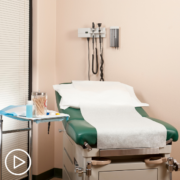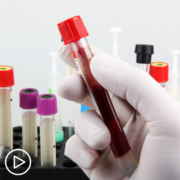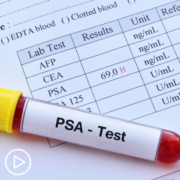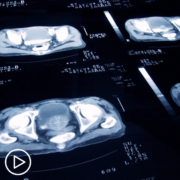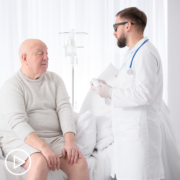Advanced Prostate Cancer: How to Access the Best Care and Treatment for YOU from Patient Empowerment Network on Vimeo.
Progress in advanced prostate cancer has led to more personalized treatment options and individualized care for people with this diagnosis. Dr. Xin Gao discusses how the results of essential testing can help guide a patient’s prognosis and treatment path, reviews available therapies, and shares advice for self-advocacy.
Bio:
Dr. Xin Gao is a Medical Oncologist at Massachusetts General Hospital. Learn more about Dr. Gao.
Download Resource Guide
See More From INSIST! Prostate Cancer
Related Resources
Transcript:
Katherine:
Hello and welcome. I’m your host Katherine Banwell. Today’s program focuses on how people with advanced prostate cancer can access the best treatment in care. We’ll review essential testing, discuss the latest research, and share tips for self-advocacy. Before we meet our guest, let’s review a few important details. The reminder email you received about this program contains a link to a resource guide. If you haven’t already, click that link to access information to follow along during the webinar. At the end of this program, you’ll receive a link to a program survey. Please take a moment to provide feedback about your experience today in order to help us plan future webinars.
Finally, before we get into the discussion, please remember that this program is not a substitute for seeking medical advice. Please refer to your healthcare team about what might be best for you. Well, let’s meet our guest today. Joining me is Dr. Xin Gao. Dr. Gao, welcome. Would you please introduce yourself?
Dr. Gao:
Yeah. Thank you very much for having me. My name is Xin Gao. I’m a medical oncologist at Mass General Cancer Center in Boston, Massachusetts. I focus on prostate cancer and other cancers involving the urinary system. I’m also involved in our clinical trials program where we’re studying newer and what we hope are better treatments for these types of cancers.
Katherine:
Well, thank you so much for joining us today. I know you’re a busy guy.
Dr. Gao:
I’m happy to be here.
Katherine:
Good. Dr. Gao, this program is focusing on advanced prostate cancer. Would you walk us through how the disease progresses in each stage?
Dr. Gao:
Sure. I think advanced prostate cancer can mean a lot of different things, but in general, it means a prostate cancer that has either spread out from the prostate gland itself to other areas of the body or has recurred despite either surgery or radiation-based therapy to the primary prostate tumor.
In each of these situations, typically the focus would on medication types of treatments and we think about advanced prostate cancer as either hormone-sensitive or hormone-resistant, or the other term in the field for it would be castration-resistant, meaning that the prostate cancer is either sensitive to hormonal therapies or perhaps it’s no longer sensitive to the most common type of hormone therapy called androgen deprivation therapy. So, those are sort of the ways that the cancer can progress, and typically all these cancers start as hormone-sensitive prostate cancers and over time, they may evolve and become resistant and become what we call castration-resistant prostate cancer.
Katherine:
Okay. So, they’re not numbered as in a lot of other cancers, like stage I, stage II?
Dr. Gao:
Meaning by stage, oh. So, there are stages. All advanced prostate cancers are by definition stage IV. All advanced cancers, in general, are stage IV but advanced prostate cancer would be stage IV. Most prostate cancers actually present as localized prostate cancer, stage I, stage II, even stage III prostate cancers and the majority of localized prostate cancers are actually fortunately quite curable with either surgery or radiation-based therapies.
Unfortunately, not all are curable and some will recur despite these curative intent treatments and others might just be inherently more aggressive biologically and they could even present with metastatic disease or stage IV disease having spread to other sites outside of the prostate gland, even at diagnosis.
When prostate cancer metastasizes or spreads, it commonly spreads by lymphatic vessels or by the bloodstream and most commonly, they tend to go to either lymph nodes or bones or some combination of both. More common areas of lymph node spread are in the pelvic areas, kind of near where the prostate gland is, or deep in the abdomen in an area called the retroperitoneum. And then bones more commonly could be in sort of the back or spine bones or in the pelvic bones, but it could go to other areas less common as well.
Katherine:
What are common symptoms of advanced disease, and how are the symptoms managed?
Dr. Gao:
So, with advanced disease, the symptoms can present in a variety of different ways.
They’re often related to where the cancer has spread to. If there’s a tumor in the prostate gland itself or next to it, some patients might experience urinary symptoms, urinary frequency, feeling of incomplete emptying or a weak urinary flow. Or even pain or discomfort of leading with urination. That’s sort of the primary prostate tumor itself. Bone metastases can cause bone pain and commonly this involves bones in the spine or back or in the pelvis.
There’s also a heightened risk of fractures with bone metastases and obviously that can sometimes cause pain. However, I think I should mention, many bone metastases actually don’t cause pain. It’s not uncommon that we see a bone scan or a CAT scan that the cancer is in multiple bones, but the patient actually, you know, I think fortunately, doesn’t feel any pain from that.
Lymph node spread, I would say, rarely causes symptoms early on, but if there’s significant enlargement of these lymph nodes or in risking anatomic areas, sometimes the lymph nodes can cause discomfort or pain. Sometimes they can compress upon major veins or blood vessels or on the ureters that drain the kidneys and cause either blood clots or lower extremity swelling if it’s the major veins or cause kidney dysfunction because the ureters aren’t draining the kidneys appropriately. And then, I think in general, as with any advanced cancer, advanced prostate cancer can commonly cause fatigue and cause patients to just kind of generally feel unwell in sort of a hard to pinpoint type of way.
I think it’s sort of the general toll that the cancer – the burden of the cancer is causing on the body and maybe taking, you know, essential nutrients or other things away from normal body organs or body cells.
Katherine:
How are some of these symptoms managed?
Dr. Gao:
So, pain, if people have pain, it’s typically managed with analgesics and pain medications, whether it’s Tylenol or ibuprofen. Other NSAID types of medications. Opiates and narcotic pain medications are commonly used for advanced prostate cancers as well to control and manage and treat the pain. And patients with cancers involving the bones that have become resistant to standard hormone therapy, we also commonly give medications called bisphosphonates.
Zoledronic acid is a common one. Or a related medication called denosumab to try to reduce the risk of fractures, to strengthen the bones a bit. And these medications can also help with bone pain to some extent. And sometimes we treat other symptoms of cancer with medications that might help improve energy levels and improve the fatigue, for example.
So, methylphenidate or methylphenidate (Ritalin) is a common medication that is used to try to help with energy levels or reduced energy in advanced cancer patients. Sometimes steroid medications can do that as well, could be helpful. Appetite, reduced appetite with advanced cancer is not uncommon, although I think for prostate cancer, we see it to a lesser extent compared to other advanced cancers.
There are other medications, steroids being one of them, and medications like mirtazapine or Remeron can be used to help try to simulate the appetite a little bit more. In terms of other symptoms, urinary symptoms, let’s say from the primary prostate tumor, that’s often co-managed with my colleagues in urology. There are medications that can be used to try to help with the urinary flow or stream in some situations or perhaps procedural interventions that might be able to help open up the urinary outlet a little bit more. Those things can be considered as well.
Katherine:
I’d like to talk about what goes into deciding on a treatment pass. What testing is used to understand a patient’s individual disease?
Dr. Gao:
There is a lot of testing that we do for – to try and characterize a patient’s individual disease and try to select an optimal management strategy for their specific cancer and their specific situation.
We look at the biopsy, the pathology. The most common type of prostate cancer is called adenocarcinoma, but rarely we see certain other types under the microscope, things like neuroendocrine or small cell prostate cancers that tend to be treated in a different way. We look at things like the Gleason score.
That tells us a bit more about sort of the aggressiveness of this cancer, as well as the PSA, you know, it’s a very good correlate for how the cancer is doing in general once somebody has been diagnosed with prostate cancer. For imaging tests, we commonly rely on imaging. We look at prostate MRIs to get an idea of the local extent of the prostate tumor. We get things like bone scans and CAT scans to look at the entire rest of the body to see if or where the cancer may have spread to.
And there are newer imaging tests like the PSMA PET scan, which we commonly use now, which is a much more sensitive test for detecting prostate cancer in 2023 compared to traditional scans like CAT scans and bone scans. I also commonly make use of genetic testing and molecular information.
So, for any patient with an advanced prostate cancer, I do recommend both what we call a germline test, which is testing for inherited cancer genes that a patient could have gotten from the parents and pass onto their kids, as well as somatic testing, which is testing the cancer itself to see what genetic mutations or alterations might’ve developed within their cancer. And that can actually factor into certain treatments that the patient may or may not be more likely to benefit from if they have these genetic mutations.
Katherine:
Dr. Gao, a patient sent in this question prior to the program. What other genetic testing, beside BRCA markers, are important for deciding future targeted therapies and how are each of them used?
Dr. Gao:
Yeah, that’s a great question. Targeted therapies have been used in a lot of different cancers and it’s only really within the past few years that we’re using them as a standard of care routinely in prostate cancers. So, BRCA II and BRCA I mutations are some of the more common mutations or genetic alterations that are targetable in prostate cancer. Recently, there have been multiple FDA approvals of different drugs that are called PARP inhibitor, which are able to target the cancer if they have BRCA II or BRCA I mutations.
Beyond BRCA2 and BRCA1, there’s a panel of what’s called homologous recombination repair genes and that’s defined differently in varying extents, depending on the specific drug. That has been FDA approved, but in general, it’s about 12-14 genes total and they actually include the BRCA2 and BRCA1 genes.
So, some of the ones that have been…it seems like the data shows maybe more activity or better efficacy with these PARP inhibitors include a gene called PALB2, P-A-L-B 2. It’s not a very common mutation that we see, but it is something that we should look for because even if it’s not common overall for the patient who has it, it could be a very helpful and useful gene to know that that they have and it certainly would warrant treatment with a PARP inhibitor.
The other sort of dozen or so…10-12 genes in this homologous recombination repair pathway, the data, I would say, is still early and it is still somewhat limited in terms of how much people with those gene mutations truly benefit from these PARP inhibitors, but I do think it’s important to look for them, to know that if they do have one of these genetic mutations that it does make a PARP inhibitor an option for them. And then, beyond these HRR genes, I always look for something called a microsatellite instability or mismatched repair deficiency. These are sort of genetic features or really a panel of about four genes involved in a cellular process called – a DNA repair process called mismatch repair.
For those patients that have either mismatched repair deficiency or microsatellite instability high cancers, I do recommend that they consider an immunotherapy medication called pembrolizumab which is FDA-approved regardless of cancer type for any MSI high or mismatched repair cancer and they’ve shown pretty solid activity for those kinds of cancers.
Katherine:
Dr. Gao, now that we know what goes into understanding a patient’s disease, I’d like to talk about treatment, starting with treatment goals. How do goals vary by patient, if they vary at all?
Dr. Gao:
Sure, yeah. I do think they vary and I think it is important to be clear about what the realistic goals of treatment might be so that the patient can make an informed decision on how the prostate cancer should be treated or managed.
Some prostate cancers are highly curable, although there isn’t anything that’s 100 percent, right? And others are curable, but we acknowledge that there may still be a significant risk of relapse despite treatment. And maybe that rough percentage, the probability of cure and sort of the potential downsides or side effects of treatment, that’s something that the patient has to weigh in terms of whether they want to proceed with that treatment or not.
And then, there are cancers, especially with advanced prostate cancers, that are unfortunately not curable, but yet treatments have the ability to significantly prolong somebody’s life, to slow the cancer progression down or even to shrink it, and to improve cancer-associated symptoms and other sources of distress that we talked about earlier.
And so, with each patient, I think it is important to talk about these treatment goals because it may not be readily clear, is this a curable cancer or not? And it might not be clear how much benefit they might expect with treatment or are we talking about a marginal benefit? And then that way, you know, they can think about it, talk about it with their family, and kind of factor into their overall benefit risk calculation about whether to do something or not.
Katherine:
Would you provide an overview of current treatment options for advanced disease?
Dr. Gao:
Sure. So, it’s a big, very open-ended question, I think.
So, I think you can divide it up into sort of the major treatment modalities, so things like radiation or radiation types of therapies, chemotherapy, hormonal therapies which are the mainstay of prostate cancer treatments, targeted therapies, and immunotherapies.
Starting with hormonal therapies which are the backbone of prostate cancer treatments, for advanced prostate cancer, androgen deprivation therapy or ADT is often given indefinitely as the typical standard of care treatment and there are various forms of ADT, most commonly in the form of long-lasting injectable medications – leuprolide (Eligard/Lupron Depot), goserelin (Zoladex), sometimes degarelix (Firmagaon) is used. And then more recently, there was an FDA approval a couple years ago of an oral pill called relugolix (Orgovyx), which is also a form of ADT or androgen deprivation therapy.
These medications block the body’s ability to make testosterone which is important for prostate cancer survival and spread. In addition, abiraterone is an oral medication that is also considered a hormonal therapy. It blocks the production on androgens or male sex hormones outside of the testes. That includes the adrenal glands and some other tissues such as prostate cancer itself. And abiraterone (Zytiga) is commonly used in advanced prostate cancer management, in addition to androgen deprivation therapy whereas ADT blocks the testes from making testosterone and androgens, abiraterone blocks the production of androgens outside of the testes.
And then finally, oral anti-androgen medications that block the prostate cancers from being able to detect androgens or male hormones and to block the androgen receptors on prostate cancers from sending cellular signals for growth and survival are also very commonly used.
There are older anti-androgen medications like bicalutamide (Casodex), flutamide (Eulexin), lutamide, and there are newer ones, stronger versions, called enzalutamide (Xtandi), apalutamide (Erleada), and darolutamide (Nubeqa). For most patients who present with advanced prostate cancer, I think this is much easier, ADT along with either abiraterone or one of the newer, stronger anti-androgens, is the standard of care for most advanced prostate cancer patients with metastatic disease.
And then, sometimes for patients with higher volume or more aggressive cancers even in the group with metastatic disease, we even add on another treatment, usually chemotherapy, something called docetaxel for what we call triple therapy. And then, maybe that’s a segue to chemotherapy, so docetaxel chemotherapy is a common chemotherapy used for prostate cancer, certainly advanced prostate cancers. Cabazitaxel (Jevtana) is also a common chemotherapy in this situation. These two are related drugs in a family of drugs called taxane chemotherapies and basically they kind of block the trafficking of important components within cancer cells and cause the cancer cell death.
Docetaxel (Taxotere) is the more commonly used one. It’s typically used earlier, before cabazitaxel. And like I said earlier, for certain patients with what we call high volume metastatic prostate cancer, it’s often used in combination with hormonal therapies early on, what we call upfront therapy for six cycles. If a patient doesn’t receive docetaxel up front, docetaxel is commonly used after progression, after the cancer has progressed on ADT and one of the oral hormone medications.
Cabazitaxel is more commonly used after a patient has previously received or progressed on docetaxel. Both drugs have been evaluated in randomized Phase III clinical trials and have shown to provide efficacy for patients with advanced prostate cancers.
In addition to these taxane chemotherapies, platinum chemotherapy, such as carboplatin or cisplatin, are sometimes used for advanced prostate cancers as well, especially for certain neuroendocrine or small cell prostate cancers. These are rarer cancers, but they tend to respond better to platinum-based chemotherapies.
Or for certain what we call aggressive variant prostate cancers, these platinum-based chemotherapies are also used in combination with either one of the taxanes or with another chemotherapy drug called etoposide. In terms of other treatment modalities, I think recently what we call radiotherapeutics or radioligand therapies have gotten a lot of press with the approval of a new medication called lutetium PSMA or 177 lutetium PSMA 617 (Pluvicto).
The brand name for that in the U.S. is Pluvicto and what this is is a drug that’s a small molecule that binds to PSMA, which is a protein highly expressed in close to 90 percent of prostate cancer, advanced prostate cancers. And the small molecule will home to the cancer and it’s linked to radioactive lutetium and the lutetium will decay in that area and lead to cancer cell death.
So, Pluvicto or lutetium was FDA approved in spring of 2022 based on randomized Phase III trials that show significant efficacy for patients with metastatic castration-resistant prostate cancer who have previously received a second-generation androgen receptor pathway inhibitor, such as abiraterone and enzalutamide, as well as a taxane chemotherapy, like docetaxel or cabazitaxel.
The medication is given intravenously, once every six weeks, for up to six doses, and there are ongoing clinical trials, actually, that are trying to evaluate this medication in earlier settings where patients haven’t gotten prior chemotherapy before. There was a press release from about half a year ago stating that they’re seeing some early encouraging signs of efficacy with this drug, even in patients who had never received chemotherapy before, so it may be a medication that is going to be used more and more so in more patients even earlier in their course of disease.
Katherine:
This actually leads me to my next question which is about research news.
Prostate cancer research is evolving quickly, like so many other cancers. And it’s important for patients to stay up to date on developing news. So, are there research advances that patients should be aware of?
Dr. Gao:
Yeah, I mean some of the treatments that I just mentioned, PARP inhibitors, pembrolizumab (Keytruda) for MSI higher and mismatch repair deficient tumors and lutetium. Those have come out of recent major clinical trials and have become the standard of care in a lot of different…in various different settings for patients. And there are always new research trials, clinical trials, that are going to either move some of these established treatments to earlier lines of setting, earlier lines of treatment, or using them in maybe combination with other drugs where we might learn that they’re more useful if we combine it with another drug or maybe combine it with hormone treatments earlier rather than later.
So, there are always clinical trials for advanced prostate cancer. There are even newer trials, novel therapies, completely new treatments that have been studied in the laboratory in say petri dish models of cancer or animal, mouse models of prostate cancer, but have shown enough early exciting data to try to move them into human beings and hopefully help advanced prostate cancer patients.
Katherine:
Dr. Gao, if a patient is feeling like they’re not getting proper care or if they’re just not comfortable with their care team, what steps would you recommend they take to change the situation?
Dr. Gao:
Yeah, I think that’s a difficult question to answer and it depends on sort of what the specifics are, but I will always encourage people to be up front with their providers, with their oncologists and their oncology team. I think it’s… it really is a collaboration and it really needs mutual trust and open communication.
And to be able to say these are the things that I wish could be a bit better or not that different or could you clarify this or answer this or what about this idea or this thing that maybe I heard about. See what their thoughts are. I think clear communication is always important and it shouldn’t – I tell my patients that I view my role as sort of advising them about what the reasonable treatment or management strategies might be in their situation and what the data shows and what is recommended.
But ultimately, it is a shared decision and the patient is in charge of their own body and own health and they can make the decision on what makes sense for them. So, again, I think it’ s a two-way street and open communication is the most important thing.
Katherine:
As we wrap up, Dr. Gao, I’d like to get your thoughts. How do you feel about where we stand with advanced prostate cancer care?
Dr. Gao:
Yeah. I think there have been a lot of advances in advanced prostate cancer care in recent years. Newer and better treatment strategies seem to come along every couple of years and I think what we’ve seen for advanced prostate cancer patients over the past, really, since probably 2015 or so, is a significant improvement in outcomes, long-term outcomes like survival and slowing down of the cancer.
And it’s… I think it’s important to acknowledge that and to acknowledge that the clinical trials in recent years have really led to a lot of improvements and really the hope that in the coming years, there’s going to be additional research, additional clinical trials, newer treatments hopefully, that will continue to improve outcomes for advanced prostate cancer patients. I also think that it’s really critical to evaluate the specific patients’ cancer characteristics, things like the genetic testing that I mentioned earlier, as well as their sort of life situations and other medical comorbidities to come to a shared decision about what makes the most sense in terms of their cancer management.
Genetic testing might open up the option for certain FDA-approved therapies or consideration of certain targeted therapies that still might be in clinical trials. And clinical trials, again, are also an option for additional treatment strategies that otherwise would not be available.
Katherine:
Dr. Gao, thank you so much for taking the time to join us today.
Dr. Gao:
You’re welcome. Thanks for having me.
Katherine:
And thank you to all of our collaborators. If you would like to watch this webinar again, there will be a replay available soon. You’ll receive an email when it’s ready. And don’t forget to take the survey immediately following this program. It will help us as we plan future webinars. To learn more about prostate cancer and to access tools to help you become a proactive patient, visit powerfulpatients.org. I’m Katherine Banwell. Thanks for joining us.


